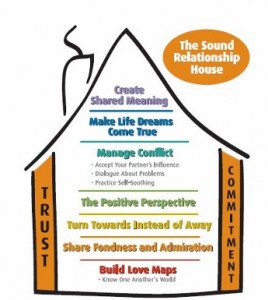Here is a review of some principles from the Gottman method that we all might keep in mind as we, with our friends, family members, strive for healthy, warm, joyful and satisfying relationships in our lives. While the piece below addresses “couples” relationships, many components apply to other types of relationships as well.
Our research shows that to make a relationship last, couples must become better friends, learn to manage conflict, and create ways to support each other’s hopes for the future. Drs. John and Julie Gottman have shown how couples can accomplish this by paying attention to what they call the Sound Relationship House, or the nine components of healthy relationships.
1. Build Love Maps: How well do you know your partner’s inner psychological world, his or her history, worries, stresses, joys, and hopes?
2. Share Fondness and Admiration: The antidote for contempt, this level focuses on the amount of affection and respect within a relationship. (To strengthen fondness and admiration, express appreciation and respect.)
3. Turn Towards: State your needs, be aware of bids for connection and respond to (turn towards) them. The small moments of everyday life are actually the building blocks of relationship.
4. The Positive Perspective: The presence of a positive approach to problem-solving and the success of repair attempts.
5. Manage Conflict: We say “manage” conflict rather than “resolve” conflict, because relationship conflict is natural and has functional, positive aspects. Understand that there is a critical difference in handling perpetual problems and solvable problems.
6. Make Life Dreams Come True: Create an atmosphere that encourages each person to talk honestly about his or her hopes, values, convictions and aspirations.
7. Create Shared Meaning: Understand important visions, narratives, myths, and metaphors about your relationship.
8. Trust: This is the state that occurs when a person knows that his or her partner acts and thinks to maximize that person’s best interests and benefits, not just the partner’s own interests and benefits. In other words, this means, “my partner has my back and is there for me.”
9. Commitment: This means believing (and acting on the belief) that your relationship with this person is completely your lifelong journey, for better or for worse (meaning that if it gets worse you will both work to improve it). It implies cherishing your partner’s positive qualities and nurturing gratitude by comparing the partner favorably with real or imagined others, rather than trashing the partner by magnifying negative qualities, and nurturing resentment by comparing unfavorably with real or imagined others.
Copied from the ‘Gottman Method’ website

